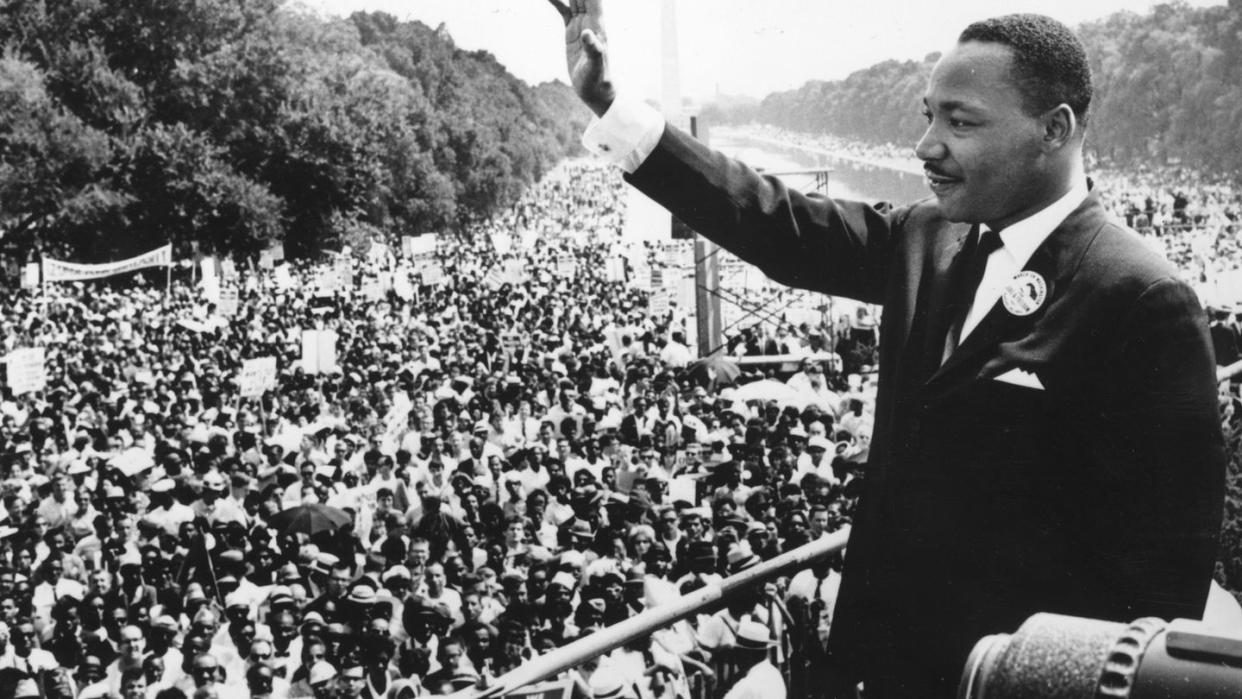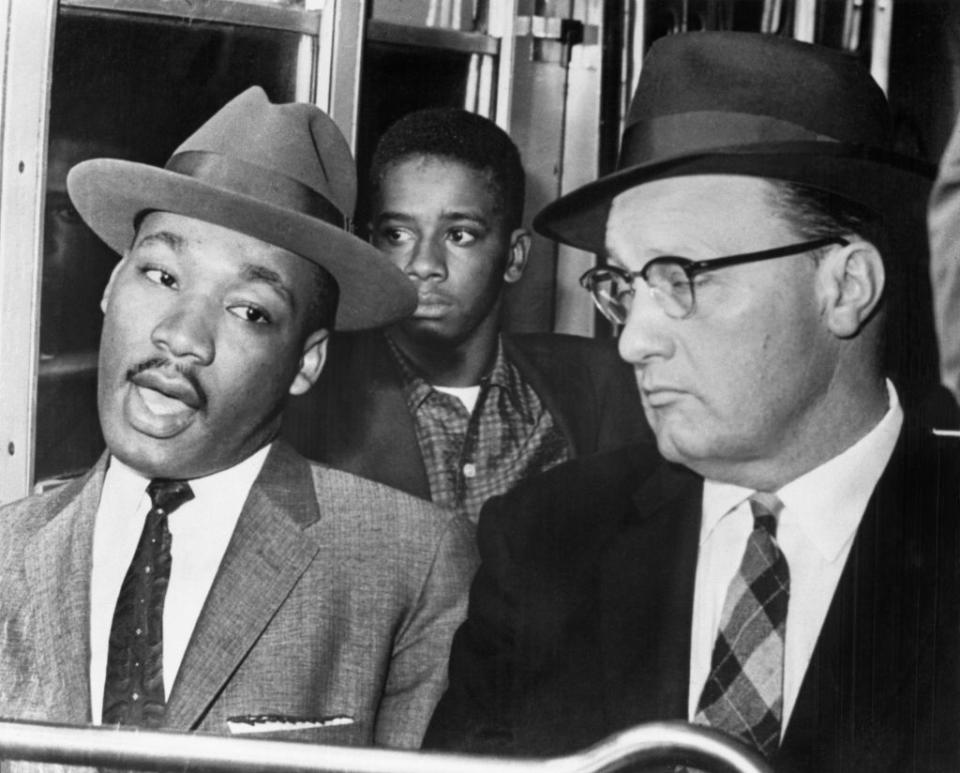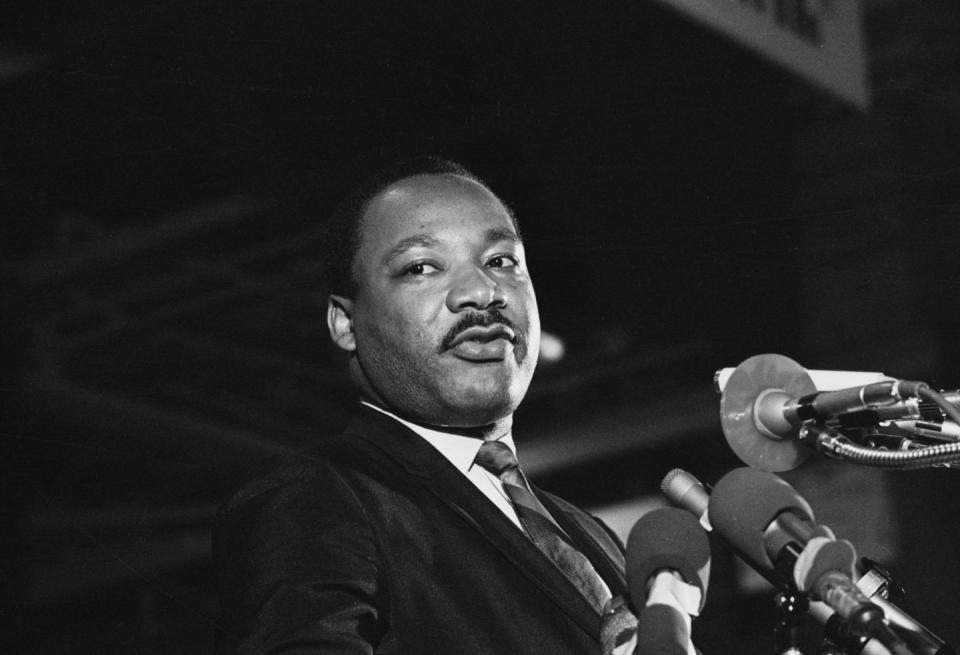17 Inspiring Martin Luther King Quotes

- Oops!Something went wrong.Please try again later.
"Hearst Magazines and Yahoo may earn commission or revenue on some items through these links."
Martin Luther King Jr. was a trailblazing civil rights activist with a soaring vision for a just America. As a Baptist minister, King was a powerful speaker, and he used his skill to demand change. Fighting for equality for Black Americans at the ballot box, in public transit, in the workplace, and beyond was his life’s work.
After King was assassinated on April 4, 1968, we are left with the eloquence of his words that continue to guide us forward as we strive to become a more perfect union. Here are 17 inspiring Martin Luther King quotes from his famous speeches and writings about education, justice, hope, perseverance and freedom.
“Intelligence plus character—that is the goal of true education.”
From “The Purpose of Education,” The Maroon Tiger, 1947
King wrote these words in Morehouse College’s student newspaper. He began his studies at the historically Black college at age 15 after skipping two grades in high school.
“If we are not careful, our colleges will produce a group of close-minded, unscientific, illogical propagandists, consumed with immoral acts. Be careful, ‘brethren!’ Be careful, teachers!”
From “The Purpose of Education,” The Maroon Tiger, 1947
As communities across the country debate their public education systems, this quote that King wrote in Morehouse’s student newspaper takes on new relevance.

“True peace is not merely the absence of tension; it is the presence of justice.”
From Stride Toward Freedom: The Montgomery Story, 1958
King’s first book, Stride Toward Freedom, chronicled his account as a key leader in the Montgomery Bus Boycott of 1955 to 1956. The massive protest ended after 381 days when the Alabama capital finally integrated its public transportation.
“Science investigates; religion interprets. Science gives man knowledge, which is power; religion gives man wisdom, which is control. Science deals mainly with facts; religion deals mainly with values. The two are not rivals.”
From “A Tough Mind and a Tender Heart” sermon, August 30, 1959
King considered becoming a doctor before following in the footsteps of his father and grandfather to join the clergy. This quote demonstrates he still held respect for the sciences.
“The ultimate measure of a man is not where he stands in moments of comfort and convenience, but where he stands at times of challenge and controversy.”
From Strength to Love, 1963
Strength to Love is a collection of King’s sermons that explore his commitment to justice, equality, and God. Judged by this quote, King measures very highly.
“We know through painful experience that freedom is never voluntarily given by the oppressor, it must be demanded by the oppressed.”
From “Letter From Birmingham Jail,” April 16, 1963
One of King’s most famous published works is his “Letter From Birmingham Jail,” a response to a newspaper article criticizing him and other nonviolent protesters seeking to reform the Alabama city.
“Injustice anywhere is a threat to justice everywhere. We are caught in an inescapable network of mutuality, tied in a single garment of destiny. Whatever affects one directly, affects all indirectly.”
From “Letter from Birmingham Jail,” April 16, 1963
King was jailed in Birmingham, Alabama, from April 12 to April 20. For part of the time, he was placed in solitary confinement.
“Out of the mountain of despair, a stone of hope.”
From “I Have a Dream” speech, August 28, 1963
This quote is one of the many featured at the Martin Luther King Jr. Memorial in Washington, D.C. King originally delivered these words on the steps of the nearby Lincoln Memorial.
“We have also come to this hallowed spot to remind America of the fierce urgency of Now. This is no time to engage in the luxury of cooling off or to take the tranquilizing drug of gradualism. Now is the time to make real the promises of democracy.”
From “I Have a Dream” speech, August 28, 1963
“I Have a Dream” is the King’s most famous speech. He delivered it during the 1963 March on Washington to a crowd of approximately 250,000 people. Although one of the lesser known parts of the speech, this quote demonstrates King’s knack for encouraging his followers to continue despite the obstacles they faced.
“Darkness cannot drive out darkness, only light can do that. Hate cannot drive out hate, only love can do that.”
From Strength to Love, 1963
King was majorly influenced by Mahatma Gandhi, who lead India’s nonviolent independence movement and believed love has power to transform societies.
“I believe that unarmed truth and unconditional love will have the final word in reality. This is why right, temporarily defeated, is stronger than evil triumphant.”
From his Nobel Peace Prize acceptance speech, December 10, 1964
King traveled to Oslo, Norway, to receive the 1964 Nobel Peace Prize in recognition of his nonviolent activism and leadership within the Civil Rights Movement.
“The time is always right to do what is right.”
From his Oberlin College commencement speech, 1965
A man of deep conviction, King continued his struggle for equality through harassment, violence, and several arrests.
“The contemporary tendency in our society is to base our distribution on scarcity, which has vanished, and to compress our abundance into the overfed mouths of the middle and upper classes until they gag with superfluity. If democracy is to have breadth of meaning, it is necessary to adjust this inequity. It is not only moral, but it is also intelligent. We are wasting and degrading human life by clinging to archaic thinking.”
From Where Do We Go From Here: Chaos or Community?, 1967
As the 1960s continued, King’s philosophy of nonviolence was met with increasing criticism from some Black citizens who favored more militant action. In turn, the civil rights leader began speaking and writing about the connection between discrimination and poverty to form a large multiracial coalition. This quote is from his 1967 book Where Do We Go From Here: Chaos or Community?
“Be a bush if you can’t be a tree. If you can’t be a highway, just be a trail. If you can’t be a sun, be a star. For it isn’t by size that you win or fail. Be the best of whatever you are.”
From a speech at Barratt Junior High School in Philadelphia, October 26, 1967
King frequently traveled across the United States while promoting his civil rights agenda. He shared these words with students at a Philadelphia junior high. The minister had lived outside the city while attending Crozer Theological Seminary from 1948 to 1951.

“For when people get caught up with that which is right and they are willing to sacrifice for it, there is no stopping point short of victory.”
From “I’ve Been to the Mountaintop” speech, April 3, 1968
“I’ve Been to the Mountaintop” was King’s final speech, which he delivered in Memphis, Tennessee, where sanitation workers were on strike. It included some of the leader’s trademark hope in a just future.
“All we say to America is, ‘Be true to what you said on paper.’ If I lived in China or even Russia, or any totalitarian country, maybe I could understand the denial of certain basic First Amendment privileges, because they hadn’t committed themselves to that over there. But somewhere I read of the freedom of assembly. Somewhere I read of the freedom of speech. Somewhere I read of the freedom of the press. Somewhere I read that the greatness of America is the right to protest for right.”
From “I’ve Been to the Mountaintop” speech, April 3, 1968
In the speech, King reflected on major moments of historical progress and compared those to then–present day in the United States.
“We’ve got some difficult days ahead. But it really doesn’t matter with me now because I’ve been to the mountaintop... I’ve looked over and I’ve seen the promised land. I may not get there with you. But I want you to know tonight that we as a people will get to the promised land.”
From “I’ve Been to the Mountaintop” speech, April 3, 1968
His final speech was eerie prophetic. The next day, King was fatally shot while standing on the balcony outside his room at the Lorraine Motel. He died at age 39.
You Might Also Like

